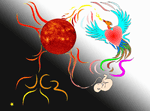« Man is only moral when life itself, that of plants and animals as well as that of humans,
is sacred to him., and he endeavours to help, as far as possible, all life in distress. »
|
Moral sense
and religion.
3 - Is religion the origin of the moral sense ?
A – Religions or the presumed origins of morality :
a – The philosophers' vision :In 1802, in "Le Génie du Christianisme" (The Genius of Christianity), Chateaubriand defended the wisdom and beauty of the Christian religion with these words : "It is not religion that derives from morality, it is morality that is born of religion".
Indeed, a truly religious person, moved by the teachings of the prophets or subjugated by the fear of eternal punishment, will feel obliged to behave in an exemplary manner.
An atheist, on the other hand, who has no obligation before God, can adopt moral behaviour for his own well-being and that of others.
So religion does not seem to be a necessary foundation for morality.
Does morality exist outside religion ? Is it a quality inherent in the individual, even before it is the result of culture ?
In his Physics, Aristotle (384-322 BC) demonstrates that there is a motionless Prime Mover at the origin of all motion in the universe. His argument is based on the principle of causality, which, applied to motion, implies that "All motion necessarily has a mover, itself moved by another mover" (Physics, VII, 1, 241 b). Since it is not possible to continue the reasoning ad infinitum, there must be an eternal First Principle at the origin of all motion in the universe..
Aristotle's argument, which proposes this prime mover, was later taken up by Voltaire (1694-1778) in « Les cabales ».
« The universe embarrasses me, and I cannot imagine
That this clock exists and has no watchmaker ».
So there is a supreme master clockmaker. Would he be the originator of morality, and would all of creation be affected ?
If so, we would expect the morality that regulates all social behaviour to be universal, but it varies from group to group and country to country. Religions themselves, in all their diversity, break it down into a multitude of sometimes contradictory injunctions. Are religions really divinely inspired ?
As for animals, which we have seen have a moral sense, do they also possess a religious sense ?
It has been observed that during violent storms, chimpanzees seem to react as if the forces of nature originated from a threatening predator that they are trying to chase away. Could this be an indication of a 'belief' in invisible beings ?
Given the similarities between the behaviour of chimpanzees and humans, and the number of genes they share, it would be tempting to think so. Their moral sense could, in this case, have its origins in a 'mystical' sense.
It is more likely, however, that their ignorance of the nature of the storm leads them to react as they do in the face of danger.
As it is impossible for us to know for certain, and to avoid lapsing into anthropomorphism, we will not dwell any further on the origins of their moral sense.
b - Why does man believe in God ?
1 - Religion as an attempt to explain the world :
It is difficult to imagine what we have never seen or experienced. To do this, the human brain uses analogies: thunder can give rise to a threatening god [cf : interpretations-in french] or mysterious events lead to a cult [cf : the cargo cult].

The cargo cult.
Man has thus imagined agents endowed with intention behind every inexplicable phenomenon or sensation.
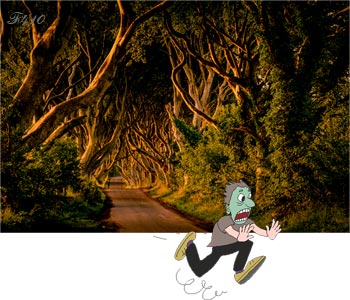
This place is haunted ! (Dark Hedges.)
Similarly, in the face of death, he was able to imagine a parallel world where family and friends could be reunited, a world identical to the known world [cf : Ancestor worship]. What else can we imagine other than what we already know to deal with what we don't know ?

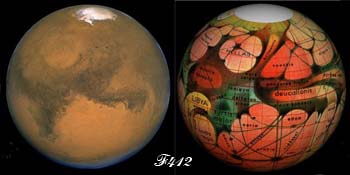
In the absence of sufficiently precise means of observation,
the first astronomers saw canals on Mars, evidence of life as they knew it on Earth.
the first astronomers saw canals on Mars, evidence of life as they knew it on Earth.

The relief of Mars,
and their interpretation by Schiaparelli in 1877.
and their interpretation by Schiaparelli in 1877.
A 2016 study [combining phylogenetics and the anthropology of beliefs], carried out among 33 hunter-gatherer populations, determined that the first form of religion was probably animism, with everything possessing a spirit, just like man. These spirits, remaining inaccessible, gave rise to the belief that they led their existence in an "afterlife": shamanism and the cult of ancestors then appeared to establish a link with these invisible entities.
The gods came later. The oldest known site dedicated to deities, at Göbekli Tepe in Turkey, dates back 12,000 years.

Göbekli Tepe site.
If evolution allowed animist religions to emerge through emotions, curiosity and analogical mechanisms, could these religions be at the origin of the moral sense ?
« In the absence of knowledge of the world, the god provides answers to its mysteries.
Religion thus provides a community of certainties. »
Religion thus provides a community of certainties. »
2 - Religion to strengthen the community bond :
Is it possible to imagine a society that is both moral and religion-free ?
Science can study what exists, but it needs to compare in order to reach a conclusion. But there is no human society without religion, which is why it is impossible to study morality alone in these conditions. If we look at countries that have suffered attempts to evict religion, such as Russia, Tibet or Cambodia, we see that these attempts have sometimes had a disastrous effect on social organisation. Whether religion was almost immediately replaced by a state religion (the cult of the supreme being during the French revolution), whether religious leaders were dismissed (like the patriarch Tikhon of Moscow) or replaced (like Gyancain Norbu in Tibet), it has always survived.

Festival in honour of the Supreme Being, 1794. Carnavalet Museum, Paris.
In support of these historical observations, studies carried out by anthropologists are now categorical. According to Joseph Henrich, a researcher in human evolutionary biology (Harvard University, USA), "By encouraging social behaviour, faith in an all-powerful God stimulated the expansion of civilisations".
This god was most often represented on Earth by the reigning sovereign. By reinforcing his power, he maintained the cohesion of the people.
However, we might wonder about the social behaviour that prevails within religion: is it really a component of the moral sense that stems from empathy (in french) ?
« Religions seem to be essential for binding human communities together. »
c - Religions as a factor in social integration :
1 - Spontaneous cooperation :
The French sociologist Émile Durkheim considered that the benefits that religion brought to society gave it a "secular utility". By binding the group together in the face of the outside world, he saw religion as fulfilling a social function. An American sociologist, Rodney Stark, based his study on the great plagues that ravaged the Roman Empire, and concluded that the early Christians, who showed greater solidarity with the sick, were more resistant to disease.
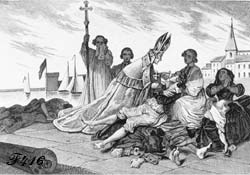
The plague in Marseille in 1720
Similarly, the anthropologist Richard Sosis, from the University of Connecticut, and the psychologist Eric Bressler, from Westfield University, studied the historical data available on 83 experiences of community life in the United States, both religious and secular, and found that religious communities lasted four times longer (an average of thirty-six years compared with eight for secular communities). This result has been linked to the greater demands placed on religious communities, which tend to consolidate the group.
Similarly, by analysing data on solidarity and mutual aid in a number of faiths, biologist David Sloan Wilson, professor at Binghamton University (USA) has shown that religions enable their followers to achieve together what they could not do alone.
While these studies suggest that religious behaviour may have been selected over the course of evolution to favour cooperation, these conclusions cannot be accepted: indeed, the living conditions of the first Christians, held together by persecution, cannot be compared with those prevailing in today's societies.
However, certain hypotheses have been verified : moralising gods are found in the largest and best-structured societies. The moral principles they share protect them from the internal conflicts that normally threaten groups that grow in size: this may explain why they have survived.
However, certain hypotheses have been verified: moralising gods are found in the largest and best-structured societies. The moral principles they share protect them from the internal conflicts that normally threaten groups that grow in size : this may explain why they have survived.
However, while societies with moralising gods are better protected from internal conflict, when competing religions coexist, rivalries between groups can undermine relations within the society as a whole - the recent example of the rohingyas in Myanmar is a perfect illustration of this.
So, even if it is true that religions encourage mutual aid between the faithful, they also generate conflicts : it is therefore difficult to attribute a moral sense to them.
2 - A moral role :
Individual morality is enough to maintain cohesion within the family. Similarly, in tribal societies, the limited number of members means that everyone can assess the others. In this way, the rules of conduct are maintained, as each individual is keen to protect his or her reputation.
But when a society gathers thousands, or even millions of individuals, this simple functioning is no longer possible and the moral system can collapse. At that point, a powerful political power must be put in place.

Individual moral sense and collective rules of behaviour.
This power will itself be reinforced by a god from whom nothing escapes.
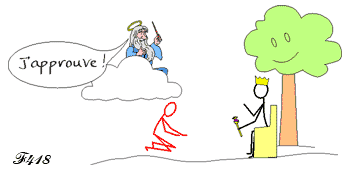
Combination of political and divine powers.
Religion will thus link and unify behaviour around a totem, a belief or a religious leader.
If the moral sense initiated by empathy tends to link close individuals, moral behaviour will become the reasonable link that transforms a group of distinct individuals into a community.
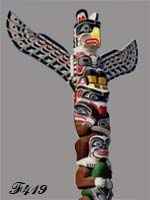 |
 |
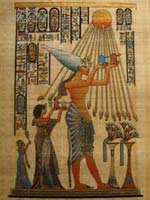 |
The totem. |
Worship of the dead. |
The cult of Aten. |
« Religion supports political power by strengthening social ties. »
B - The political role of religion :
a – Why was a single God imposed ?The emergence of the great religions was the result of the new conditions that arose in empires whose size prevented direct interaction between individuals and distanced power from its people.
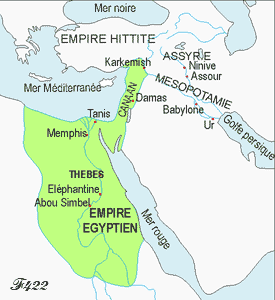
Maximum extension of the New Kingdom around 1450 BC.
Establishment of the cult of Aten under Amenhotep IV (1353 BC to 1337 BC).
Establishment of the cult of Aten under Amenhotep IV (1353 BC to 1337 BC).
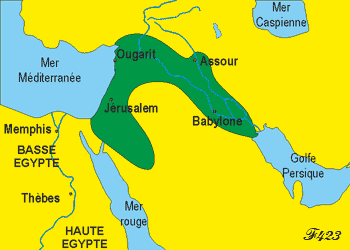
Babylonian kingdom (626 BC to 639 BC).
.Where political power alone could not ensure social cohesion, religion could provide a link between people. However, while empires such as Egypt, Persia and Babylon were satisfied with multiple gods with well-established functions, the gods represented by statues could disappear with the destruction of their images and temples.
As we have seen, beliefs evolved towards a humanisation of the gods, culminating in a divine family and finally an all-powerful major god.
For this evolution of the god to take place, societies had to undergo gradual change, as the transition from one belief to another could not take place without the support of the people. This is how, in Egypt, the establishment of the god Aten (in french) by the sole will of Amenhotep IV (the future Akhenaten) ended in failure.
So how was the god Yahweh able to establish himself ?
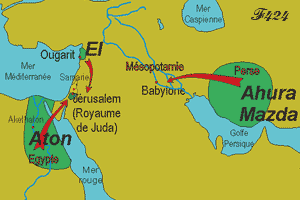 |
 |
Evolution towards the major god. |
Transformation of the defeated god into a god of justice. |
If it was difficult to maintain the link between the members of an empire, maintaining this link within a defeated and exiled people was an unattainable challenge. Until now, the god had one essential function : to protect the people from an external enemy and provide for their needs. But the god of the small kingdom of Judah had just failed in his mission: defeated by Nebuchadnezzar, part of his people went into exile and could have disappeared, assimilated by his conqueror. By moving from the status of defeated god to that of god who punishes his people for their disobedience, he became the god who both guides and unifies a scattered people: 2,500 years later, these people, having retained the common bond of belief and ritual, remain united and identical to themselves.
This is how a dispersed society can preserve its identity for millennia if it retains a common religion that unites it beyond space and time.
« Religion is not the source of moral sense.
Religion, by reinforcing the authority in place, favours its maintenance. »
Religion, by reinforcing the authority in place, favours its maintenance. »
b - The historical evolution of religions in societies - progress and recession :
Although research has shown that the moral sense has been selected by evolution, it has not been able to demonstrate a selection of religious belief, which is more likely to result from our ability to seek answers to unexplained phenomena.
On the other hand, we can see that the moral sense, which becomes apparent in early childhood, asserts itself as a social bond when the family is established.
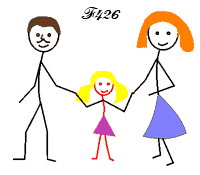
How did the societies that successively adopted the single god function?
Two main periods can be distinguished :
- Initially, the individual moral sense took hold under the impetus of guides such as Abraham, Moses, Jesus and Muhammad.
- Then political and religious powers took over.
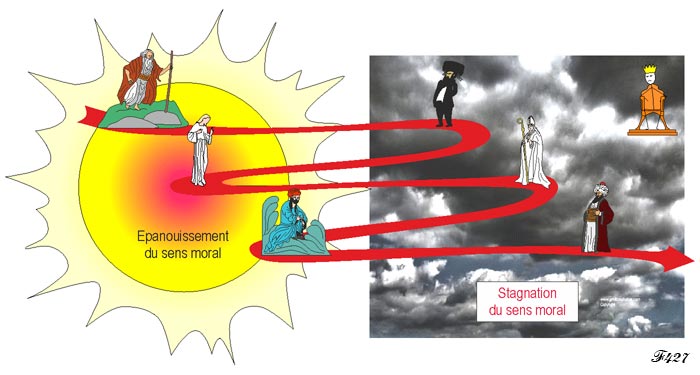
From the opening up of consciousness to the establishment of dogmas.
This transformation is identical to that seen in the development of the child : the innate moral sense will be reoriented according to the times, cultures and environmental conditions.
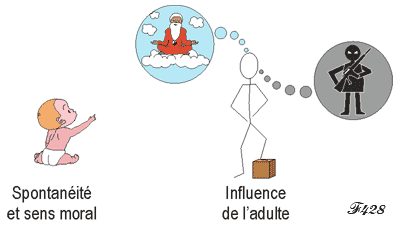
An adult's behaviour influences that of his child.
c – The collective evolution of the moral sense :
We have discussed this tendency to hold on to what we have. How is this reflected in the development of societies?
First of all, there is a long maturation of collective thought. Then comes a personality who concentrates all the previously acquired knowledge in his teaching. By bringing this knowledge to the fore, he or she creates a focus for development that renews and improves pre-existing beliefs, marking a historic stage in the evolution of societies...
In this way, the transition to a single God was accompanied by progress (Abraham abolished sacrifices to the gods and Moses laid the foundations of all social behaviour), without however eliminating all the negative elements (the hold of men over women, with the right to life and death, persisted).
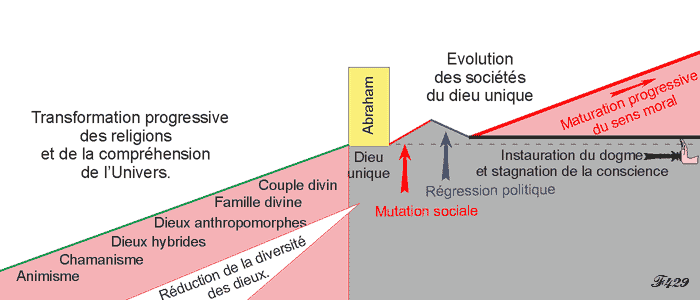
Evolution of single-god societies.
It is only after an inevitable regression that the slow evolutionary process will begin again. It will coexist with a stagnation of knowledge and moral sense linked to the establishment of a dogma that is often unshakeable.
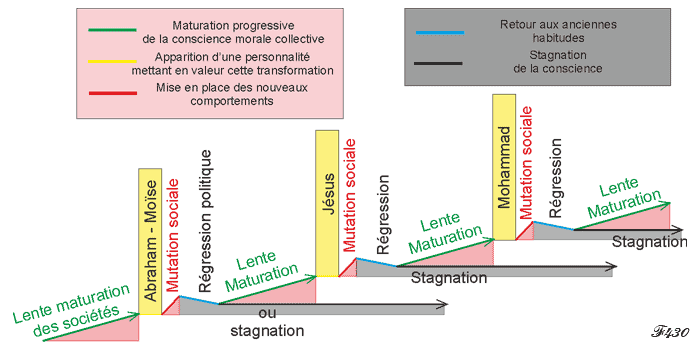
Evolution and successive regressions.
« If the innate moral sense has been selected by religions,
the biases of thought and collective interests have fixed beliefs. »
the biases of thought and collective interests have fixed beliefs. »
C – The influence of religion on the moral sense - The role of God :
God's role will be exercised in many ways to strengthen the individual's moral sense.a – Prayer :
The first practice is to strengthen social ties through collective prayer. The primary aim of these prayers is to thank the deity for his blessings, but they are often reduced to begging for additional blessings.
In so doing, the adult, who could have been aware of the extraordinary world in which he lives, acts like a child worried about himself and his future, imploring an Almighty Father to protect him and bring him everything he has not had access to.

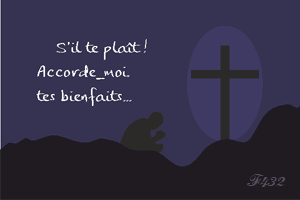
Once the social link has been established, rituals will provide the individual with the essential means to soothe his torments.
b - Purification rituals :
These too are an adaptation to man's natural need to belong to a community. Christian baptism marks the entry of the newborn into the extended family after being cleansed of "original sin". For the adult convert, it marks integration into a protective community.
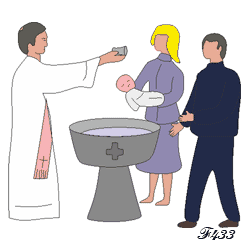
(Baptism of the newborn - entry into the community).

(Baptism of Jesus - change of community)
c - Reparation for faults - Penances :
While justice imposes punishment, religion suggests other ways of making amends. For example, when it is impossible to make amends for a wrong committed against another person and relieve the victim's pain, voluntarily inflicting punishment on oneself seems an appropriate response. This is why, in many religions, it is possible to atone for a fault by various penances (fasting, flogging, mutilation).
These practices may be the result of an individual choice, or they may be encouraged by the religious institution.
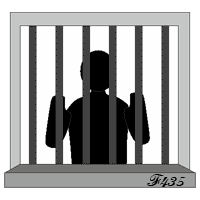
Incarceration.

Flagellation.
d - Immanent justice :
Secular morality cannot always respond to certain injustices, which then go unpunished. What's more, the punishments meted out to the guilty are often deemed insufficient by the victims.
Through heaven and hell, divine justice can make up for these shortcomings. Those who have escaped temporal justice will not be forgotten in the hereafter. The same will be true for the benefactor whose exemplary conduct on Earth has not been recognised: Paradise will be theirs.
And yet, the moral rules enshrined in the ancient texts that initiated the great religions and that should guide billions of followers along the path of moral sense demonstrate at every turn how little influence they have on behaviour. These texts bring them together around the ideal they represent and the higher authority that inspired them, but in reality few are capable of putting this ideal of life into practice.
Two different religious models contribute to this sense of justice.
- The first type of reparation is that of reward or punishment: it is described by the weighing of souls among the Egyptians, and this judgement has been taken up in today's religions.
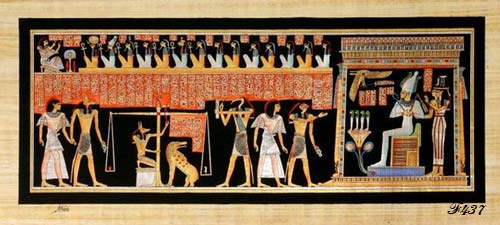
Weighing of the heart among the Egyptians of the New Kingdom.
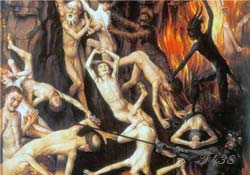 |
 |
The punishment of hell or paradise.
- For its part, the concept of karma represents a different approach : everyone can go wrong, but after a period of suffering they always have the opportunity to understand their mistakes. If they are transformed, they will interrupt the cycle of reincarnations.
This approach tends to focus on individual happiness, with social cohesion only a secondary concern once the individual has achieved inner peace.
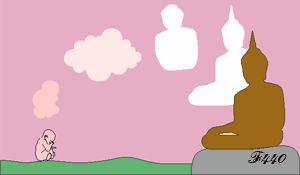
Transformation in rebirth.
Could religion, which is based on a multitude of rules of behaviour that bind the members of a community together, have an origin other than divine ?
« Religion promotes social cohesion.
The moral rules it proposes can only be expressed to the full
in a stable society. »
The moral rules it proposes can only be expressed to the full
in a stable society. »
D – The flaws in religion :
a – Le coût - gaspillage et souffrance, les incohérences biologiques :1 - From well-being to suffering :
We have seen that the innate moral sense tends to bring well-being, both to oneself and to others. This contradicts the biological costs that religions impose on their followers : believers are often led to take risks that put their health and sometimes even their lives at risk in the name of their faith !
Why do people do this ? What are the real benefits ?
2 - From self-awareness to waste :
Prohibitions, regular rituals, sacrifices - how did such behaviour come to be ? And above all, why ? They represent a paradox in terms of what we know about evolution. In terms of natural selection, any animal that devoted time and energy to anything other than feeding, reproducing, observing and discovering its environment would see its survival compromised. Even the time a young animal spends playing is training for attack, defence and hunting, all of which are essential for its future life.
Yet religion causes an impressive amount of biological waste. To gauge the extent of this, we need only look at the time needed and the number of lives sacrificed to build a cathedral in the Middle Ages, the time devoted to prayer and multiple mortifications, not to mention the wars of religion !
In the light of all this data, we can only wonder : if religion did appear at some point in the human race, why wasn't it eliminated by evolution ?
b - Credulity and religion - The flaws in the critical mind :
1 - The mechanisms that lead us to believe :
We are now familiar with the circumstances surrounding the emergence of religious belief. But to understand the process in greater depth, we need to understand the general mechanisms that drive people to believe.
When we receive information, we rarely react immediately by questioning it. In the absence of evidence to confirm or refute the information, critical thinking seems to be non-existent : we are inclined to believe.
In fact, in conditions of survival, speed of reaction is essential, and has therefore been selected by evolution.
Let's take an example : you're going about your business when suddenly a friend appears behind you and frightens you. Before you've even thought about it, you jump. It is only afterwards that you recognise that there is no threat.
 |
 |
The reaction occurs before recognition.
The brain is programmed to act. Confronted with information whose veracity it cannot quickly verify, it immediately anticipates the response: this speed of decision is an essential parameter in the way our convictions are forged.
Immediately « believing » in a danger is the only valid response for escaping it.
This is an instinctive reaction.
Elle est très éloignée du sens moral de l’enfant dont la réaction première est de faire confiance, avant de modifier son jugement sur la personne si elle apparaît non fiable [cf : Learning through trust].
Children form their judgements from what they feel, but also from the logical progression of their thinking based on the reality of the facts [cf : Natural abilities].
What remains of the child's abilities in the adult ?
We know the extent to which critical thinking [cf : The negation circuit-in french] has difficulty when information is spectacular. It tends to weaken all the more when a statement is repeated by a large number of people. To take a current example, if the same information is found on several Internet sites, or repeated by hundreds of people who have not sought to verify it, belief is reinforced: the mechanics of credulity are underway, reinforced by the pleasure of holding and relaying spectacular information.
The spectacular video of a ghost walking down a corridor,
going down a flight of stairs, or opening a door to show itself,
makes us forget that this immaterial "entity" is not dependent
material conditions that are imposed on living beings.
going down a flight of stairs, or opening a door to show itself,
makes us forget that this immaterial "entity" is not dependent
material conditions that are imposed on living beings.
Conviction can very quickly become belief.
In the course of a human lifetime, we can imagine that from a very young age, children will be confronted with information that goes against their intuition of the laws of physics. Father Christmas, who makes thousands of toys and distributes them overnight, is accustomed to the impossible.
For teenagers and many adults today, social networks are the most effective vectors of belief (they can lead people to believe, for example, that the clouds of condensation that form at high altitude as airliners pass overhead are poisons deliberately dispersed to harm humans).
We have also seen that ignorance of a phenomenon has led to the search for a plausible and usually reassuring explanation. The existence of a god fulfils expectations : as a benevolent entity endowed with powers, he can grant prayers; as a threatening identity, he can be coaxed with gifts.
Experiences, most often resulting from illness (in french) also reinforce these certainties.
Broadly speaking, there are three ways in which new beliefs can arise.
- Our senses can deceive us. In extreme cases, it is even possible for alterations in perception to give rise to extravagant beliefs. This is the case with certain pathologies where subjects no longer recognise one of their limbs and conclude that another person (in french) is behind their back.
Similarly, the sensation of 'déjà vu' can be explained by a temporary malfunction in memory management: normally, awareness of an event occurs before it is memorised, but in certain cases (a delay in nerve conduction, for example) memorisation can precede awareness, giving the impression of having already lived through the moment.
- Our reasoning may be inadequate, leading us to a conclusion despite incomplete knowledge (in french). For example, ignorance of the mechanisms of condensation at high altitude may have led to the belief that aircraft were dispersing a poison.
- Finally, we can receive information whose content will captivate us [pareidolia].

Cydonia Mensae, observed in 1976,
then in 2001 by Mars Reconnaissance Orbiter.
then in 2001 by Mars Reconnaissance Orbiter.

The Witch's Head Nebula.
Each of these mechanisms is likely to give rise to false beliefs.
2 - The transition from reality to belief :
The tendency to believe is understandable, however, as it usually fulfils our expectations.
But why this widespread inability to renounce reality?
Desire and belief obey very different cognitive functions: desires are representations of things or events that correspond to objectives to be achieved, while beliefs aim to describe as best we can what reality is like.
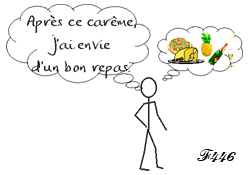 |
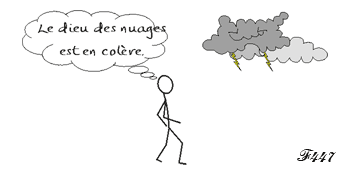 |
Objective. |
Description. |
c - Contradictions - religion, a factor of intolerance and conflict :
The morality instituted by today's religions is omnipresent. Not only has it supplanted the respectful morality towards Mother Earth of animist societies, but it has prevailed over philosophical movements such as Epicureanism and Stoicism which also proposed precise and demanding ethics to their followers.
No doubt it is the ease with which the gods grant their blessings and pardons that keeps them going. Perhaps it is also the simple answers that comfort minds imbued with their own certainties that has led to this blind adherence...
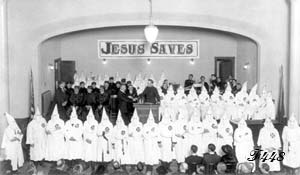
Ku Klux Klan meeting.
The contradictions that exist within each religion are astonishing. The most conspicuous of them raise questions when they are exploited by extremists.
Jean 13 : 34 « Love one another. »
Catholicism and the Inquisition
Christianity and slavery.
Exode 20 : 13 « You shall not murder. »
Exode 20 : 15 « You shall not steal. »
Judaism and annexations
Koran 48:5 "Had God willed, He would have made you one community. But He wished to test you by the gift He has given you. Seek to surpass one another in good deeds. All of you will return to God, and He will enlighten you about your differences. »
Koran 10: 99 "If your Lord had willed, all those on earth would have believed. Is it for you to force people to become believers ?
Islam and slavery.
Islamism and terror.
All these forms of extremism have generated, and continue to generate, terror and incomprehension among populations who have only ever wished for peace.
It is therefore reasonable to ask what God thinks of man, how he interprets his advice or injunctions, and the plundering of his creation. [NdA-in french]
d - The imperfections of natural selection :
It goes without saying that natural selection cannot instantly create perfect organisms or perfect behaviour.
On the other hand, it creates systems capable of adapting over time, and which will be eliminated if they are insufficient.
Death has thus been integrated into the evolutionary process. A limited lifespan means that only those systems that are useful at a given time and in a given environment are retained. This process can be seen in both the biological and political spheres. It appears as early as the foetal stage, in the apoptosis mechanism that eliminates tissues that have become useless, and we find it in democratic states where the president or prime minister has a limited term of office.
Cognitive science also reveals that while we are equipped with mechanisms capable of verifying the coherence of the information we receive, they emphasise that our mind cannot be exhaustive : to form an opinion, it uses numerous shortcuts that are far from perfect.
The American psychologist Robert Cialdini has described one such shortcut: when there is uncertainty, we tend to build our knowledge and beliefs on what is accepted by the greatest number. The more widely held a belief is, the more likely it is to be retained by the cognitive system.
It is therefore thanks to the pooling of current knowledge that the responses obtained are selected.
This strategy proves to be correct in most cases, but it can also lead to adherence to false ideas. Cult leaders are well aware of this : one of the strategies they use is to group their followers together and ensure that they are always surrounded by like-minded people.
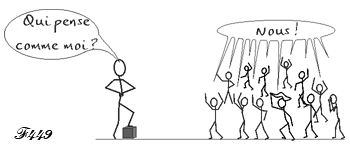
Another weakness of our cognitive system that is frequently used by manipulators is the search for well-being : one of evolution's selections is to choose actions that give pleasure, and avoid others. Arousing attention with a promise of pleasure (a forthcoming political decision or happiness-generating object) therefore very often eliminates all critical thinking.

I'll bring you money, security and happiness.

With her safety, adventure, ecology, happiness...
All these biases in our thinking mechanisms entail vital risks that evolution has not overlooked. That's why evolution has set up a system for filtering information.
The art of the person wishing to influence then consists in formulating his or her assertions by giving the information an apparently logical spin, or by using accomplices to create a consensus effect.
Today, false information relayed by a large number of fragile minds outweighs proven information about the danger of a media personality, a virus or a beauty product.
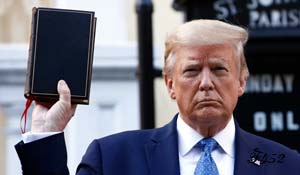
Basing your speech
on a divine book
can make people accept false information.
on a divine book
can make people accept false information.
All you have to do is browse through the news sections, which are full of scams of all kinds, not forgetting the misleading advertisements that are all too often taken for genuine information, when in fact they are the result of manipulation that effectively exploits all the biases of human thought.
Advertising for a stain remover.
Advertisement for a glue.
What is the state of the world's major religions today ? Has their development been affected by changes in our cognitive system ?
E - Are religions a factor or a consequence of integration into society ?
We have seen that religions have become a cement of society, complementing political power.Postulating a transcendent being at the origin of everything, they posit that this universal sense of immanent justice stems from a divine will.
But by justifying the moral intuitions of believers in this way, they deny the natural causes that flow from evolution.
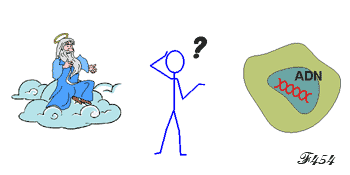
Divine will or evolution ?
a - Does religion help to build bonds ?
Some evolutionists maintain that religion derives from a set of social skills: they are therefore an epiphenomenon deriving from pre-existing abilities in man.
Most biologists, on the other hand, see religion as a particular evolutionary adaptation providing an advantage for survival or reproduction.
However, while religion unifies people who share the same convictions, it does not always play the same role in societies. Certainly, it unifies trends within territories where Christians, Buddhists, Muslims and ethnic and political groups with sometimes opposing inclinations can live side by side.
In this sense, they contribute to the exercise of a group's moral sense, which must nevertheless adapt to the morality of society as a whole. However, this same solidarity between members of a religion can blind them to other beliefs, and lead them to forget that all human beings have a common origin.
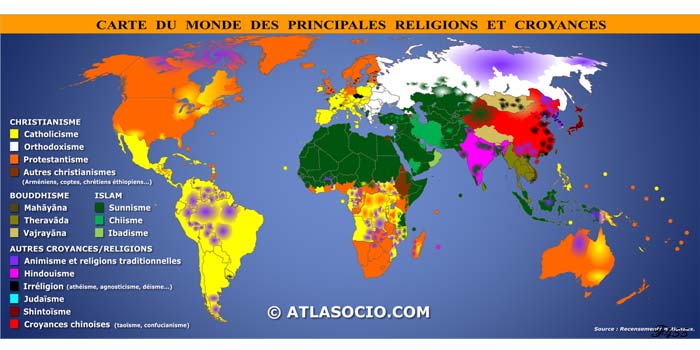
Religions unite populations
that extend beyond the borders of states.
that extend beyond the borders of states.
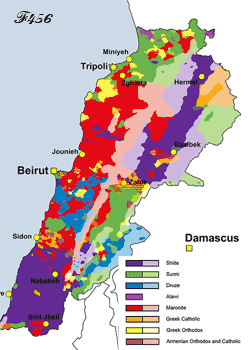
Within a state (in this case Lebanon), they can generate conflict.
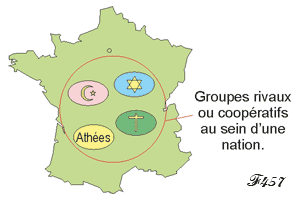
In a secular state, respect for freedom of religion
allows people of different beliefs to live in harmony.
allows people of different beliefs to live in harmony.
« While religions encourage cooperation and mutual support,
they can also be rivals and a source of conflict. »
they can also be rivals and a source of conflict. »
b - Back to the origins of morality :
Although religions may be deeply established in societies, it cannot always be said that they are important for the flourishing of moral values. Moreover, when we look at the general behaviour of atheists, we find that they are often far more moral than others who justify all their actions in the name of the religion or god that animates them.
For example, a 2012 study by researchers at the University of California at Berkeley showed that feelings of compassion in the face of tragedy or poverty were more likely to encourage atheists and agnostics to be generous than believers.
Another study, this time conducted in Malaysia, also seems to show that believers are more inclined to give to those of their own faith.
« If religions encourage cooperation and mutual aid,
they don't have a monopoly on it. »
they don't have a monopoly on it. »
F - Reasons to believe :
a - From the child's moral sense to religious morality :1 - Learning to trust :
If the rational functioning of adults is so questionable, how do children go about learning from those who give them information ?
To begin with, it is obviously impossible for them to doubt what they are told: the presumed existence of Father Christmas is the best example. To have any doubts, you either have to realise that what you are being told does not correspond to reality, or you have to have access to other information that contradicts what you have been told. New information is constantly compared with previous information to get as close as possible to reality.
As we have seen, in children, trust begins with observation and, if possible, verification. Subsequently, trust will only be granted to those who have provided proof of the seriousness of their information. Those who spread false information on social networks could take their cue from the behaviour of children as young as 2 years old.
2 - Learning to doubt :
Researchers have been able to show that, from the age of 16 months, children exclude knowledge provided by informants who give incorrect names to already familiar objects. Then, around the age of three, they show themselves capable of distinguishing between accurate and erroneous sources.
Similarly, they do not blindly follow an apparently reliable source if it turns out to contradict what they have discovered for themselves.
What's more, once they have assimilated a piece of information, they may even forget that they may have possessed different knowledge in the past, a mechanism similar to that of apoptosis, which allows us to shed systems that have become useless.
b – Does man believe in God ?
1 – The moral sense of the believer :
If religion indicates rules of conduct, and even if these rules originate with a god, do human beings obey these rules ? And if he ignores them, can we say that he believes in God ?
On the contrary, all his actions show that he is concerned only with satisfying his desires.
Whatever his religion, all too often he is thinking only of getting what he wants : a piece of land, an object, a woman, a child. Prayer is revealing in this sense : « Give me this day... » « Forgive me... »
Where are the personal efforts ? Where are the thanks ?
Moreover, to obtain what he wants, the believer too often thinks only of using all the means at his disposal : weapons, murder, theft...
He will then justify his actions by the will of his god or prophet and, if his religion allows, he will ask his moral adviser to grant him absolution, or God himself to grant him forgiveness.
A man who truly believes in God is not a man who appropriates the good of others; he is a man who loves, shares and respects the creation of the God in whom he believes.
2 – The place of young people in maintaining religions :
We know that children, before they acquire language, already possess a sense of mutual aid, a knowledge of goodness and badness, and a spirit of justice. What happens to these skills as they grow into adulthood ?
Confronted with injustice, the young person rebels, but encounters resistance from the habits in place. In this unequal battle, they rarely have the upper hand.
If their aspirations are too different from the objectives of the society in which they live, they are left with anarchy, unless they retreat into a tribal state where they develop their own economic system : although they often use religion as a symbol of belonging, they rarely believe in a god.
But if they too don't think about God, who does ?
3 - What does God think ?
Faced with all these discrepancies between faith in a universal God who speaks of love and respect, and the lack of adherence to these principles, we can ask ourselves what reasons man invokes to justify his behaviour.
What thoughts does he attribute to God ?
For example, what does God think about abortion, the death penalty, slavery, gay marriage, drugs and race ?
To answer this question, psychologists Nicholas Epley and his colleagues at the University of Chicago interviewed a large number of people, all of them believers. They found that the people questioned tended to consider that God's point of view on these issues was... their own !
Conservatives are certain that God would be in favour of the death penalty but opposed to gay marriage or abortion. Liberals, on the other hand, maintain that, in his goodness, he would allow abortion and gay marriage, and would ban the death penalty.
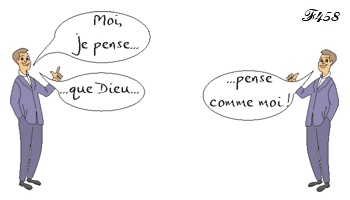
Is the one God so indecisive? Are there as many gods as there are believers ?
To try and understand the basis of these assertions, the psychologists measured the brain activity of the people questioned. They found that thinking about God activates areas of the brain responsible for « self-referential thinking », areas that become active when the subject talks about himself or herself and expresses his or her own opinion on a subject. These areas remain silent when the subject is talking about others.
Conversely, it has been found that subjects who are predisposed to moments of mindfulness have less activity in these same areas.
In believers, the same areas of the brain are activated whether they are thinking about God or themselves !
While for 2,500 years the Bible has stated (Genesis 1:27) that "God created man in his own image, in the image of God he created him", today's neuroscience suggests that it is man who creates the divinity that meets his expectations.
« Did God create man in his own image ?
or did man create the God that suited his desires and certainties »
or did man create the God that suited his desires and certainties »
c – Is religion at the origin of the moral sense ?
Does the moral sense originate in God ?
We have seen that very young children distinguish between right and wrong long before they acquire religious convictions.
We have also seen that atheists sometimes show more compassion towards others than believers.
Given these two arguments, we might conclude that the moral sense is more human than divine.
What's more, we've learned that 'moral' behaviour can be found in primates and many other species.
So it's perfectly reasonable to assume that evolution is responsible for the emergence of the moral sense.
« With their different origins, morality and religion have turned out to be
two distinct and complementary factors in social integration.
Morality is the result of a feeling capable of uniting all living beings.
Religion, for its part, is a human adaptation that uses components of moral sentiment
to strengthen social ties. »
two distinct and complementary factors in social integration.
Morality is the result of a feeling capable of uniting all living beings.
Religion, for its part, is a human adaptation that uses components of moral sentiment
to strengthen social ties. »
Next chapter :
4 – The moral sense in the light of science : (continued)

